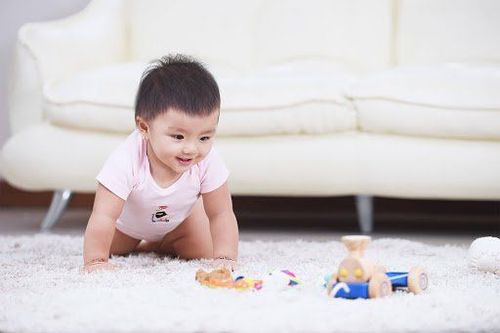This is an automatically translated article.
The article is expertly consulted by Master, Doctor Huynh Bao Toan - Department of Pediatrics - Neonatology - Vinmec Nha Trang International General Hospital.All babies develop at different rates, but there is certain information about each stage of your baby's development. Now your baby is 10 months old and you have realized that he has made a lot of big changes. Children are more independent, enjoy playing and socializing with people more. The following article will help us learn more about the physical, motor, cognitive and emotional development of 10-month-old babies.
1. 10 month old baby's motor skills
Your 10-month-old is enjoying the freedom to explore the world around them in many different ways. Babies this age can crawl, move from a sitting to standing position, squat or sit down, and walk around while holding objects or holding your hand. In a few months, your baby will move faster and more often.At 10 months, your baby's coordination of motor skills has improved a lot. Children this age are quite good at picking up small objects. Children can also spot items easily at this age and pick them up quickly. You need to make sure that you keep all objects that could be dangerous to your child, causing them to suffocate when swallowed, such as coins and other small items, out of their reach.
At this time, children are interested in finding ways to fit smaller objects into larger ones. 10-month-olds are skilled at holding toys with one hand while using the other to do other tasks.
Trắc nghiệm: Bài kiểm tra chỉ số trí tuệ cảm xúc (EQ) của bạn
Chỉ số trí tuệ cảm xúc Emotional Quotient (EQ) là một chỉ số dùng để nói lên trí tưởng tượng, đánh giá và cảm xúc của một con người. Hãy làm bài trắc nghiệm sau để biết chỉ số EQ của bạn là bao nhiêu?
Nguồn tham khảo: webmd.com
2. Physical, cognitive and emotional development of 10-month-old babies

Children can use two hands independently, one hand can hold objects while the other is doing other tasks. Children will be very excited to dispose of things intentionally.
At this stage, your child can start moving around the room, shuffling things in your room. However, if your baby wants to move somewhere quickly, he will crawl instead of walking, you will be surprised because he can crawl faster than you think.
Children understand when you say “yes, no, hello, goodbye” and can wave, shake, and nod. Children can also answer simple questions like “where are your shoes” and start pointing or looking for them.
10 months old baby starts to get upset when you let him play alone and leave the room. These are the first signs of complex emotional development in children, all children go through this stage with normal manifestations from about 10 months of age, signs are strongest at 12 to 15 months of age, starting to decrease gradually from 2 years of age. Children will show sadness when they are left behind, but it is nothing serious and shows that you and your child have bonded.
3. How will 10-month-old babies eat and sleep?

The average 10-month-old baby needs about 13 to 14 hours of sleep a day, including a nap (20 to 30 minutes) and a longer nap (2 to 3 hours), however Every baby is different, maybe your baby needs more sleep or maybe he sleeps less than other babies.
Some children like to have a habit, before going to bed often sucking on a pacifier, baby's fingers or pulling blankets. Others like to bang their heads for the same reason, babies rhythmically bang their heads against the crib, you shouldn't worry when they do this, it looks scary but babies do this because they are sleepy. So, unless your child injures himself, it's best not to try to prevent it, as this is normal child development at this stage.
There will be days when your baby eats more than usual, however, by the age of 10 months, your baby has gradually stabilized his daily food intake and you also realize which foods he does not like, which types Which children are interested in. There will be times when the child refuses the foods you have prepared, even the ones he really like, so don't force him because he will eat when he's hungry, let him decide for himself.
At this age, children like to hold food or use spoons by themselves. This makes children feel more excited during mealtime.

Your baby can now enjoy larger sizes of soft foods and other foods, so if your baby still likes pureed foods, consult your doctor.
Children's milk needs are about 500ml of milk per day, usually divided into 3 times (early morning, after lunch and at bedtime).
Until the child is 5 years old, you need to give him daily vitamins, including vitamins A , C and D unless he is given a lot of formula every day.
You can encourage your child with the following activities:
Even though your baby can't talk yet, involve your child in conversations. For example, respond to your child's babbles or continue a conversation using a stuffed animal or puppet. You will encourage your child to keep talking and learning new words. Let the children listen to the tunes. Any kind of music will encourage your child, whether it's pop music, children's music...Your baby will love to dance to the beat. Hide toys and help children find them so they get used to the idea that things continue to exist, even when they can't see them. By 10 months, your baby can babble, make eye contact, and respond to your words and actions. If you are concerned that your baby is slow to communicate, call your pediatrician for advice.
10-month-old babies need 5mg of elemental zinc/day to eat well, reach the correct height and weight and exceed the standard. Zinc plays a role in affecting most biological processes taking place in the body, especially the breakdown of nucleic acids, proteins... Organs in the body when zinc deficiency can lead to a There are a number of diseases such as neurological disorders, irritability, etc. Therefore, parents need to learn about the role of zinc and guide them to appropriate zinc supplements for their children.
In addition to zinc, parents also need to supplement their children with other important vitamins and minerals such as lysine, chromium, B vitamins,... errands.
Please regularly visit Vinmec.com website and update useful information to take care of your baby and family.
References: Pregnancybirthbaby.org.au; webmd.com; emmasdiary.co.uk














